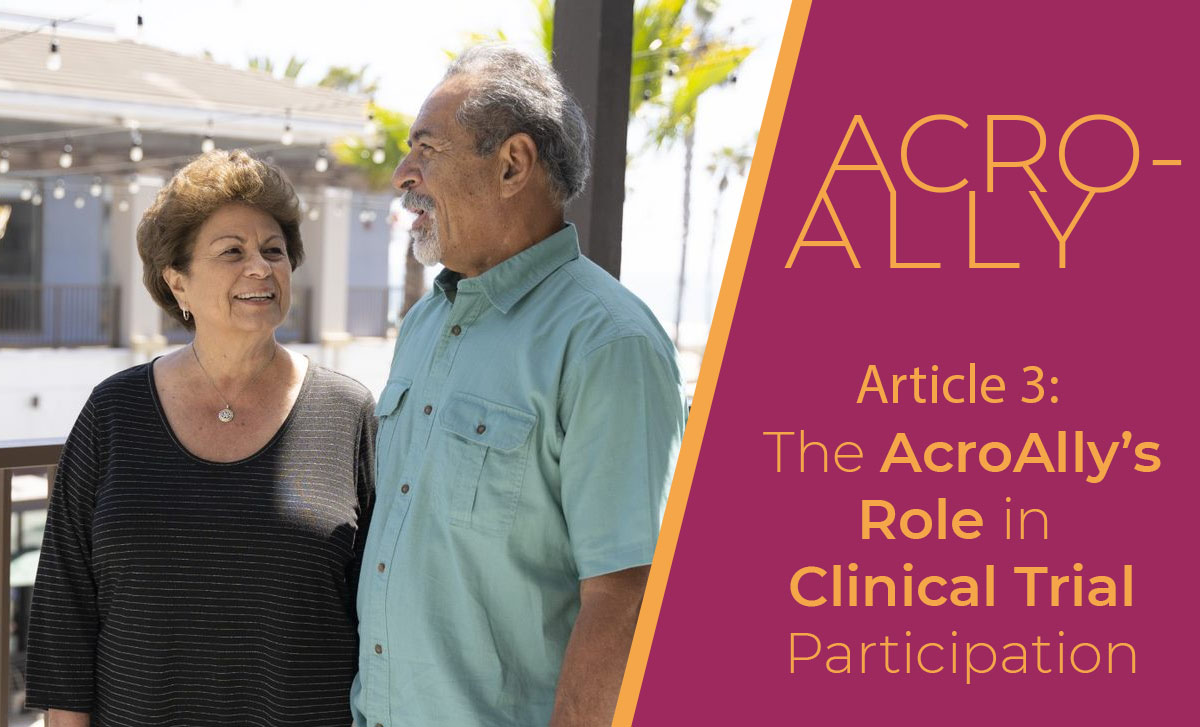As an AcroAlly, the types of things you do for the person with acromegaly (PWA) in your life can vary from small day-to-day tasks, such as cleaning the house, to bigger ones, such as managing medication. Another significant responsibility you may have for the PWA is finding and accessing clinical trials. Because there aren’t many resources available to support a person with a rare disease like acromegaly, an AcroAlly will often conduct research and put the clinical trial on the PWA’s radar. And your role may not stop there. Providing support, encouragement, and logistical help during the trial is very common.
You may be wondering why a PWA would want to participate in a clinical trial. And what you should both know and expect before deciding if participation is a good option. To help answer these and other questions, we’ve put together a brief clinical trial overview.
What is a clinical trial?
While there are different types of clinical trials (which we’ll explore below) with varying areas of focus, their shared goal is to uncover new treatments that can improve people’s health. However, regulatory agencies need to know what’s safe, what works, and what doesn’t in humans to discover effective new treatments and therapies. This kind of information can’t always be learned in the lab or through non-human trials.
Naturally, the safety of clinical trial participants is paramount, and in the United States health authorities such as the Food and Drug Administration (FDA) and approved ethics committees such as Institutional Review Boards (IRBs) regulate clinical trials.
Why participate in a trial?
Deciding whether to get involved in a clinical trial or not is a highly personal decision. The PWA will likely need to talk it over with close friends, doctors, or other family members before they feel comfortable deciding. And the reasons for participating in clinical trials are as varied as the people who enroll.
For the PWA, clinical trial participation can be:
- An opportunity to try new therapies that aren’t yet approved
- A way to contribute to research that could ultimately improve their condition
- A chance to help others in the future
- A chance to find other treatment options when current treatments haven’t worked or the PWA suffers from side effects that negatively affect their life
Learning the types of trials
There are many different types of clinical trials. However, the kind of trial you research and discuss with the PWA depends on their personal goals and comfort level.
Here are some examples of different kinds of trials you may encounter as you investigate:
- Preventive: Evaluates new medications, vitamins, minerals, supplements, vaccines, and/or lifestyle changes that might lower a person’s risk of certain diseases or conditions.
- Screening: Attempts to find the best ways to detect certain diseases or conditions before patients experience symptoms. This trial also tries to determine if earlier detection of disease decreases a person’s risk of severe harm or death.
- Diagnostic: Tries to discover new ways to diagnose and detect certain medical conditions and to improve testing methods, and the effectiveness of procedures and tools
- Treatment/intervention: Finds new treatments for a disease or condition. This trial can involve new and/or existing drugs, psychotherapy, a new device, or a new surgical approach. Assuring the safety of participants is the priority.
- Therapeutic: Investigates a treatment, not necessarily pharmacological, that is believed likely to benefit participants who receive the intervention
- Non-therapeutic: Obtains knowledge that may contribute to the future development of treatments and procedures.
Understanding the phases of a trial
Technically there are five potential phases of a trial, though only three are required for all programs.
Phase 0: Researchers determine a drug’s safety before it’s approved to study in humans
Phase 1 (required): Identifies the most effective (and safest) dosage levels of the new treatment
Phase 2 (required): Participants in this phase are people who have the disease or condition (such as acromegaly). This phase focuses on learning how the treatment affects the body and works for a specific disease. The study continues if the treatment is deemed safe and has some benefit.
Phase 3 (required): During this phase, researchers want to study the drug’s effects in a larger population of participants (can range from hundreds to thousands) who have the disease. Researchers may also use a placebo. This phase is also when the regulatory agency reviews the whole development program and the results of the clinical trials before deciding whether to approve the new drug.
Phase 4: This phase is usually conducted after a drug is approved and marketed to monitor a specific possible safety concern or monitor side effects in a particular population.
How can I help the PWA find a clinical trial?
If the PWA in your life is interested in participating in a clinical trial, an excellent place to start looking is clinicaltrials.gov. This database is supported by the US National Library of Medicine and is a reliable source of information about publicly and privately funded clinical studies worldwide. And it’s often where researchers and doctors go to look for clinical trials. You could also contact local hospitals and universities to find studies or ask patient advocacy associations for recommendations. Free membership websites such as ClinicalConnection can also connect patients to clinical trials.
Has the PWA decided that they are interested or want to participate in a clinical trial? Then check out our AcroAlly Journal resource. For more detailed tools, exercises, and resources to help AcroAllies like you show up in important, positive ways in clinical trial participation and beyond, check out the full article, “Showing Up: Supporting Someone with Acromegaly.”
Exercises
Resources for AcroAllies and Others
Rare Disease Caregiving in America report
Was this information helpful to you? If so, please share with others and subscribe to receive the latest content.


